Death in Oslo Read online
Page 3
She could not get used to it. No matter where she was, whatever the occasion, whoever she was with, with no consideration for time or discretion, they were always there. Of course she understood that it had to be like that. But equally, she had realised after barely a month in office that she would never actually get used to the more-or-less invisible bodyguards. The bodyguards who were around her during the day were one thing. She quickly learnt to accept them as part of daily life. She could distinguish them from one another. They had faces. Some of them even had names, names that she was allowed to use, even though she realised that they were likely to be false.
The other ones were worse. The countless invisible ones; the armed, concealed shadows that constantly surrounded her without her ever really knowing where they were. It made her feel uncomfortable; a misplaced sense of paranoia. They were watching over her. They wished her well, to the extent that they actually felt anything more than a sense of duty. She thought she had prepared herself for life as a target, until some weeks before she was sworn in as president, she realised it was impossible to prepare yourself for a life like this.
Not completely, anyway.
Throughout her political career, she had focused on opportunities and power, and judiciously manoeuvred herself in that direction. She had of course met with opposition en route, professional and political, but also a fair dose of ill will and agitation, envy and malevolence. She had chosen a political career in a country with a long history of personified hatred, organised slander, unprecedented misuse of power, and even assassination. On 22 November 1963, as a horrified thirteen-year-old, she had seen her father cry for the first time, and for some days afterwards had believed that the end of the world was nigh. She was still a teenager when Bobby Kennedy and Martin Luther King were killed in the same tempestuous decade. But she had never actually thought of the assassinations as personal. For the young Helen Lardahl, political assassination was an abominable attack on ideals, on the very values and attitudes that she greedily lapped up. Nearly forty years on, she still got shivers down her spine whenever she heard the start of the ‘I have a dream’ speech.
When two hijacked planes ripped through the World Trade Center in September 2001, she therefore interpreted it in the same way, as did nearly three hundred million of her compatriots – it was an attack against the American ideal. The close to three thousand victims, the unbelievable material damage, the permanent change to the Manhattan skyline all merged into a greater whole: the American dream.
Thus every victim, every courageous firefighter, every fatherless child and every broken family became a symbol of something far greater than themselves. And this made it easier for the nation and those left behind to bear the loss.
That was how she had experienced it. That was how she had felt.
Only now, now that she had taken on the role of Target No. 1, had she started to understand the underlying deceit. Now it was she who was the symbol. The problem was that she didn’t feel that she was a symbol; she was more than that. She was a mother. She was a wife and a daughter, a friend and a sister. For nearly two decades she had worked solely towards achieving this goal of becoming the President of the United States. She wanted power, she wanted possibility. And she had succeeded.
At the same time, the deceit had become increasingly clear to her.
And it could be very bothersome on sleepless nights.
She remembered one of the funerals she had gone to, in the way that they had all attended funerals and memorial services – senators and congressmen, governors and other prominent figures, all wanting to be seen to be sharing the Great American Grief, in full view of photographers and journalists. The deceased was a woman who had recently been employed as a secretary in a company that had its offices on the seventy-third floor of the North Tower.
Her husband could not have been much more than thirty. He sat there, on the front bench in the chapel, with a toddler on each knee. A little girl of about six or seven sat beside him, stroking her father’s hand over and over, almost manically, as if she already understood that he was about to lose his mind and needed to be reminded of her existence. The photographers concentrated on the children: the twins, aged one or two, and the lovely little girl, dressed in black, a colour that no child should have to wear. Helen Bentley, on the other hand, stared at the father as she passed the coffin. What she saw in his face was not grief, or certainly not grief as she knew it. His features were distorted by despair and anger, pure simple fear. This man could not understand how life would go on. He had no idea how he was going to manage to look after the children. He didn’t know how he was going to make ends meet, to have enough money to pay the rent and school fees, to have the energy to raise three children on his own. He had achieved his fifteen minutes of fame because his wife had been in the wrong place at the wrong time and was now absurdly exalted as an American hero.
We used them, Helen Bentley thought to herself, and stared out of the panorama windows that faced south over the dark Oslo Fjord. There was still a strange, pale blue light in the sky, as if it wasn’t quite ready to accept the night. We used them as symbols to make people toe the line. And we succeeded. But what is he doing now? What happened to him? And the kids? Why have I never dared to find out?
Her guardians were out there. In the corridors. In the rooms around her. On the roof and in parked cars; they were everywhere, looking after her.
She had to get some sleep. The bed looked inviting, with a big, down-filled duvet, like the one she’d had as a child in her grandmother’s attic in Minnesota; when she was blissfully ignorant and could close the world out simply by pulling a checked duvet over her head.
This time ‘the people’ would not close ranks. That was why it was worse and so much more threatening.
The last thing she did before falling asleep was to set the alarm on her mobile phone. It was half past two, and bizarrely, it was already starting to get light again outside.
TUESDAY 17 MAY 2005
I
As always, the Norwegian national day had started before the devil got his shoes on. Oslo Police had already arrested more than twenty teenagers out celebrating their final year in school, for being drunk and disorderly. They were now sleeping it off while they waited for their fathers to come and bail them out with indulgent smiles. The rest of the school-leavers, or ‘Russ’ as they were popularly called, were doing their best to ensure that nobody slept in or was late for the national-day parade. Cheap buses that had been converted and fitted with sound systems that cost the earth boomed through the streets. Here and there, a small child was already dressed up and out, and they ran like puppy dogs after the painted Russ buses and begged for the traditional Russ cards from the school-leavers. Groups of war veterans gathered in graveyards – fewer and fewer for each year that passed – to celebrate peace and freedom. Brass bands trudged through the town to a half-hearted march. Offkey trumpet notes ensured that anyone who might still against all odds be asleep could now just as well get up and have the first coffee of the day. In the city’s parks, confused junkies emerged from under their blankets and plastic bags, unable to grasp what was happening. The weather was the same as normal, with clouds breaking up to the south, but no sign that the temperature would rise. On the contrary, there was every reason to expect a shower or two, judging by the grey skies to the north. Most of the trees were still half naked, though the birch trees were now sporting buds and pollen-saturated catkins. All over the country, parents forced woollen underwear on their children, who had already started to pester them for ice cream and hot dogs, long before breakfast. Flags fluttered and flag ropes rattled on a brisk breeze.
The kingdom of Norway was ready to celebrate.
A policewoman stood shivering outside a hotel in the centre of Oslo. She had been standing there all night. As discreetly as possible, she looked at her watch at steadily shorter intervals. Someone would be coming to replace her soon so she could knock off. She had managed to snatch the occ
asional conversation with a colleague who was posted about fifty or sixty metres away, but apart from that, the night had been interminable. For a while she had tried to pass the time by guessing who was a bodyguard. But then, at around two in the morning, the steady stream of people coming and going had stopped. As far as she could see, there was no security on the roofs. No dark, easily identifiable cars with secret agents had cruised by since the American president had been dropped off and escorted into the hotel around midnight. They were, of course, still there. She knew that, even if she was only a constable who had been sent to decorate the outside of the hotel in a newly cleaned uniform – and to get cystitis.
A cortège of cars was approaching the main entrance of the hotel. The street was normally open to all traffic, but now it was closed, with loose metal barriers creating a temporary square outside the modest entrance.
The constable opened up two of the barriers, as she had been instructed to do in advance. Then she retreated to the pavement. She edged her way towards the entrance. Maybe she could catch a glimpse of the President up close, on her way to the national-day breakfast. That would be a welcome reward for a hellish night. Not that she was usually bothered about that sort of thing, but the woman was the most powerful person in the world, after all.
No one stopped her.
Just as the first car pulled up, a man came sprinting out of the hotel door. He had a bare head and was not wearing an overcoat. He had a walkie-talkie in a holster over his shoulder, and the constable could see the top of the butt of a gun just inside his open jacket. His face was remarkably devoid of expression.
A man in a dark suit got out of the passenger seat of the first car. He was small and compact. Before he was fully out of the car, the man with the walkie-talkie, who had come to meet him, grabbed hold of his arm. They stood like this for a few seconds, the larger man with his hand on the smaller man’s arm, as they had a whispered conversation.
The small Norwegian did not have the same poker face as the American. His mouth fell open for a few seconds, before he pulled himself together and straightened up. The policewoman took a couple of tentative steps closer to the car. She still couldn’t make out what they were saying.
Four other men had come out of the hotel. One of them was having a muted conversation on a mobile phone while he stared blankly at a ghastly polished steel sculpture of a man standing waiting for a taxi. The three other agents were gesturing to someone the policewoman couldn’t see, and then, as if on command, they all looked in her direction.
‘Hey, you! Officer! You!’
The policewoman gave an uncertain smile. Then she lifted her hand and pointed to herself with a questioning expression.
‘Yes, you,’ one of the men repeated, and bounded over to her. ‘ID, please.’
She produced her police ID from her inside pocket. The man looked at the Norwegian coat of arms. Without even turning the card to check the photograph, he handed it back.
‘The main door,’ he hissed, as he turned to run back. ‘No one in, no one out. Got it?’
‘Yes, yes.’ The policewoman swallowed, wide-eyed. ‘Yes, sir!’
But the man was already too far away to hear that she had eventually remembered how to say it politely. Her colleague who been on the same night shift was also heading towards the main entrance. He had obviously been given the same instructions as she had, and seemed uncertain. All four cars in the cortège suddenly accelerated, spun out of the square and disappeared.
‘What’s going on?’ whispered the constable, positioning herself in front of the double glass doors. Her colleague looked utterly confused. ‘What the hell is going on?’
‘We’ve just got to . . . We’ve just got to watch this door, I think.’
‘Yeah, I realised that. But . . . why? What’s happened?’
An elderly lady tried to get the doors to open from inside. She was wearing a dark red coat and a funny blue hat, with white flowers around the rim. Pinned to her chest she had a 17th of May ribbon that was so long it almost touched the ground. She eventually managed to fight her way out.
‘Excuse me, ma’am. I’m afraid you’ll have to wait a while.’ The policewoman gave her friendliest smile.
‘Wait?’ the woman exclaimed in a hostile voice. ‘I have to meet my daughter and granddaughter in quarter of an hour! I’ve got a place at—’
‘I’m sure it won’t be long,’ the policewoman assured her. ‘If you could just . . .’
‘Can I be of help?’ asked a man in a hotel uniform, as he strode quickly over from the reception desk. ‘Madam, if you’d like to come this way . . .’
‘Oh, say! can you seeee, by the dawn’s early liiight . . .’
A deep voice suddenly resounded through the morning air. The policewoman spun round. A large man in a dark coat carrying a microphone was approaching from the north-west, where the blocked road led to a parking place on the south side of the main railway station. He was followed by a brass band.
‘What so prouuudly we hailed . . .’
She recognised him immediately, and the musicians’ white uniforms were unmistakable as well. She suddenly remembered that, according to plan, the Sinsen Youth Brass Band and the man with the powerful voice were going to help make the President feel at home at seven thirty sharp, before she was taken to the palace for breakfast.
A roll of drums grew into a roll of thunder. The singer took a deep breath and gathered his strength for a new burst: ‘At the twilight’s last gleeeaming . . .’
The brass band was trying to play something that resembled a march, whereas the singer obviously preferred a more theatrical style. He was always a note or two behind, and his exaggerated movements were somewhat in contrast with the musicians’ military posture.
Madam President had still not appeared. It was a while since the cortège had driven off. The Americans had barely managed to bark out their instructions before dashing back into the hotel foyer, and were now nowhere to be seen behind the closed doors. Only the old woman with the hat was still there, fuming behind the glass. Someone had obviously immobilised the door-opener. The young policewoman was standing on her own and had no idea what to do. Her colleague had vanished without her knowing where to. She wasn’t even sure if it was right for her to take orders from a foreigner. And no one had come to relieve her, as agreed.
She should perhaps call someone.
Maybe it was the cold, or the nerves that were inevitable with such a high-profile job. Whatever the reason, the forty-strong brass band and the theatrical singer continued doggedly with their rendition of ‘The Star-Spangled Banner’ on the closed road that was doubling up as an unsuccessful parade ground, with only a lone policewoman as audience.
‘Jesus, Marianne! Jesus Christ!’
The policewoman turned around. Her colleague came tearing out of a side entrance. He had lost his hat, and she adjusted the peak of her own cap as a reprimand.
‘The woman’s disappeared, Marianne.’ He was gasping for breath.
‘What?’
‘I overheard two . . . I just wanted to know what was going on, that’s all, and—’
‘We were told to stand here! To watch the door!’
‘I don’t need to take orders from them! They don’t have jurisdiction here. And we were supposed to knock off over half an hour ago. So I just went in there . . .’ he pointed frantically, ‘and the hotel staff, like, they didn’t stop me, uniform and all that, so I—’
‘Who’s disappeared?’
‘Bentley! The bloody president!’
‘Disappeared?’ she echoed in a flat voice.
‘Vanished! And no one knows where! That is . . . I heard two of the guys talking together and . . .’
He stopped and pulled out his mobile phone.
‘Who . . .’ Marianne stuttered, covering one of her ears: the brass band was reaching a climax. ‘Who are you calling?’
‘The papers,’ her colleague whispered. ‘We’ll get at least ten thousand kroner
for this story from VG.’
She grabbed his phone from him in a flash.
‘We will not,’ she hissed. ‘We have to get hold of . . . to get hold of . . .’ She looked at the mobile phone as if it would give her the answer ‘Who should we . . .?’
‘. . . and the hooome of the braaave!’
The song was sung. The singer gave a hesitant bow. Someone in the brass band laughed. Then there was silence.
The policewoman’s voice was uncertain and shrill. Her hand shook as she held out the phone to her colleague and continued: ‘Who . . . who the hell should we ring?’
II
The Minister of Justice’s personal assistant was alone in the office. She took three lever arch lever files from a metal cabinet in the locked archive: one yellow, one blue and one red. She laid them on the minister’s desk and then went to put on some coffee. She went to the stationery cupboard and got pens, pencils and pads for the meeting room. With a deft hand, she switched on three computers, her own, the minister’s and the Secretary General’s. She picked up a stopwatch from her desk before going back to the archive. She pushed aside one set of bookshelves without much problem. A panel with red numbers on it came into view. She started the stopwatch, then punched in a ten-figure code and checked the time. Thirty-four seconds later she punched in a new code. Stared at the stopwatch. Waited. Waited. Ninety seconds later, another code. The door opened.
She picked up the grey box and let the rest stay where it was. Then she went through an equally rigorous routine to lock everything and closed the door of the archive.
It had taken her exactly six minutes to get to the office. She and her husband had been on their way to visit a niece in Bærum to celebrate national day with egg-and-spoon races and waffles at Evje school when her mobile phone rang. As soon as she saw the number on the display, she asked her husband to turn round. He had driven her straight to the Ministry without any questions.

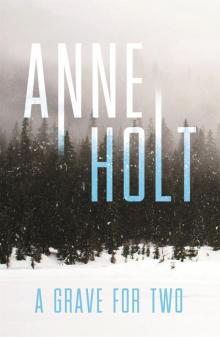 A Grave for Two
A Grave for Two Dead Joker
Dead Joker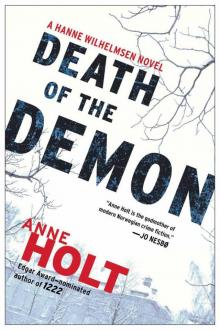 Death of the Demon: A Hanne Wilhelmsen Novel
Death of the Demon: A Hanne Wilhelmsen Novel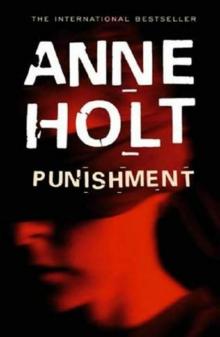 Punishment aka What Is Mine
Punishment aka What Is Mine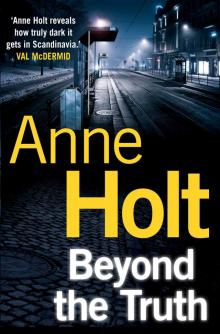 Beyond the Truth
Beyond the Truth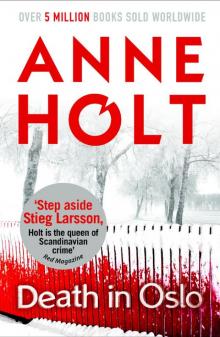 Death in Oslo
Death in Oslo The Blind Goddess
The Blind Goddess What Never Happens
What Never Happens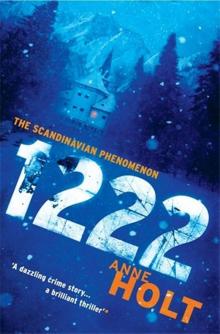 1222
1222 In Dust and Ashes
In Dust and Ashes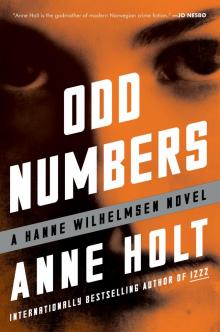 Odd Numbers
Odd Numbers What is Mine
What is Mine What Dark Clouds Hide
What Dark Clouds Hide Blessed Are Those Who Thirst
Blessed Are Those Who Thirst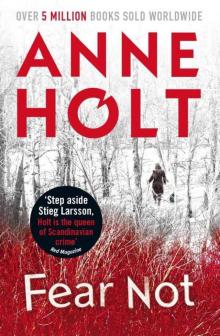 Fear Not
Fear Not No Echo
No Echo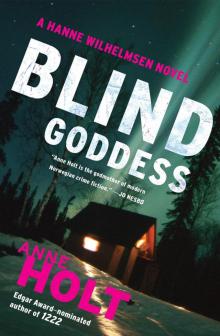 Hanne Wilhelmsen - 01 - The Blind Goddess
Hanne Wilhelmsen - 01 - The Blind Goddess